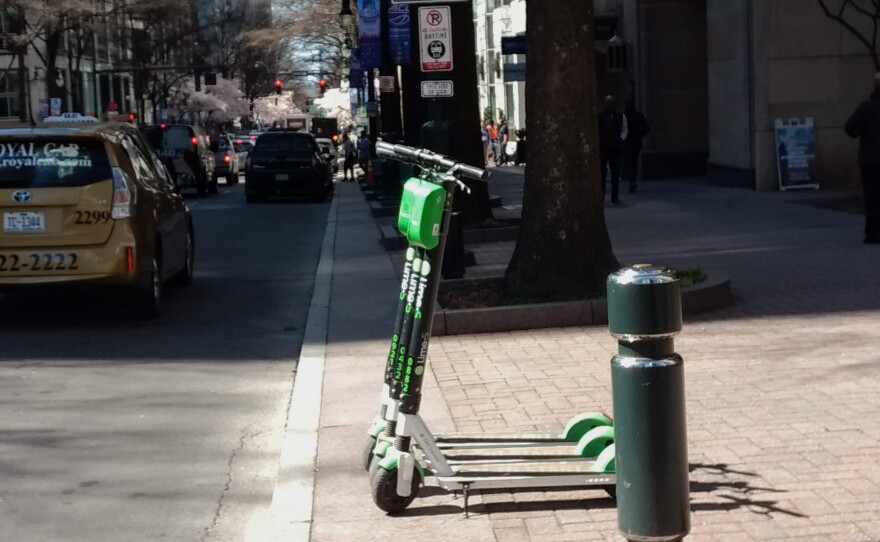It has been 10 months since electric scooters appeared on Charlotte streets. Since then, city officials have been trying to figure out how to manage things like parking and safety. This week, the city began a six-month pilot project using small electronic payments that it hopes will help.
Charlotte is one of three cities — along with Detroit and Omaha — working with the Charlotte-based mobile payment company Passport. The plan is to test whether small fees can be used to incentivize good parking and safety behavior. Scooter-by-scooter data gathered wirelessly by Passport will allow the city to adjust fees, said Dan Gallagher, who oversees scooters for Charlotte Department of Transportation.
“If a scooter rider is doing all the right things, the fee that would ultimately be charged would be heavily discounted," he said. "If a scooter rider is doing all the wrong the things, the scooter fee that would be charged to the vendor would be increased."
[Related Content: Charlotte Rules Would Mandate Scooters For Low-Income Neighborhoods]
Gallagher said the city's goal isn't to generate revenue, but to encourage good behavior.
Rising or falling fees could be used to make sure parked scooters are not blocking sidewalks, to get users to wear helmets or to ensure they follow traffic rules. Passport also can track whether companies are putting scooters beyond uptown, especially near bus and rail stations. Gallagher said the city might decide to let companies park scooters free in those areas, while charging a fee in others.
Three scooter companies — Lime, Bird and Spin — are currently permitted for up to 400 scooters each in Charlotte. Until now, the city hasn't charged any fees. In some other cities, companies pay hundreds of dollars a year per scooter — arbitrary numbers that local officials seemingly pulled out of a hat, said Evan Costagliola, the head of transportation partnerships at Lime, which is part of the pilot.
“We think this is a way to eliminate unsustainable fees and policies that are established in the absence of data," he said. "This is something we think is going to be a model nationally."
Costagliola said he hopes the hard data on ridership also will push cities to eliminate caps on the number of scooters.
"Most likely 400 (scooters) is not enough," he said. "To me, the caps are artificially suppressing demand. This will be trying, through data, to optimize the fleet size."
MONTHLY CHARGES
Scooter companies would get a monthly bill based on how well their scooters meet the city's criteria. Whether they pass fees on to riders depends on how high they are, Costagliola said.
"We don't do that now but if fees are exorbitantly high, we would consider it," he said.
The pilot is just beginning, so no rules or fees have been set.
The three cities, Lime and Passport will be trying to figure all that out, said Kate Wagoner, the Director of Urban Mobility at Passport.
"It really gives us an opportunity to experiment and iterate with different pricing models," Wagner said. "So the pricing is really going to be driven by the city and it depends on the city's goals."
Passport brings lots of experience to the test. The company pitched scooters, in part, as a parking problem – something it knows well. It built its business originally on mobile parking payments.
Passport now has about 600 clients worldwide, including the City of Charlotte. It's behind the CATS Pass mobile payment app used on the Lynx Blue Line light rail.
The city hopes all the new data will help as it develops new rules and policies. In January, the Charlotte City council adopted its first definition of scooters, set a maximum speed of 15 miles an hour and banned them from sidewalks uptown.







